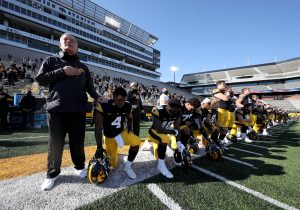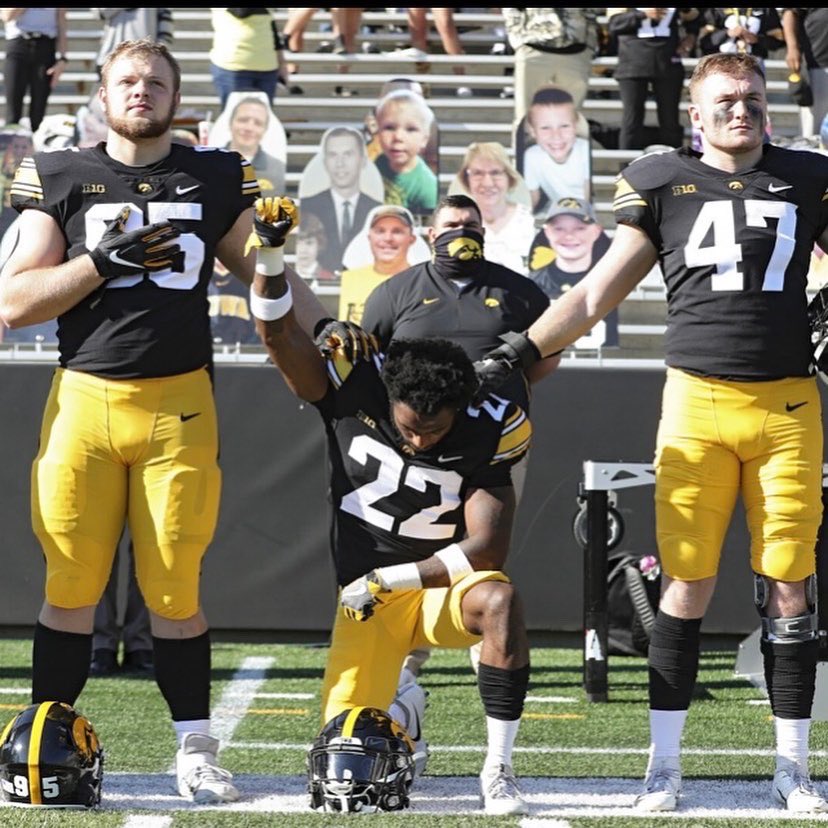World needs more people like Iowa offensive lineman Mark Kallenberger
By Pat Harty
IOWA CITY, Iowa – The world needs a lot more people like Mark Kallenberger to set the right example.
Kallenberger is among approximately 30 players on the Iowa football team who have chosen to kneel during the National Anthem, but the junior offensive lineman from Bettendorf is one of very few white players on the team to kneel.
Kallenberger was asked during a zoom conference on Tuesday to explain his reasons for kneeling, and his answer was impressive to say the least.
He isn’t kneeling for attention, or just to be different.
Kallenberger has chosen to kneel because he truly believes it’s the right thing to do under the delicate and polarizing circumstances.
He sympathizes with his black teammates, three of whom are his roommates, because he sees up close the struggles they have to endure.
“I’ve seen some stuff from those guys,” Kallenberger said of teammates Mekhi Sargent, Keontae Luckett and Yahweh Jeudy. “And things aren’t right in the moment right now.”
Kallenberger also sees the United States being rocked by racial unrest and division, a problem that hit close to home this summer when multiple former black players accused the Iowa program of racial disparities.
It seems apparent that Kallenberger was raised in a family that believes strongly in racial equality and helping those less fortunate.
Kallenberger talked proudly on Tuesday about how his family has helped to support one of his closest friends, who is black and from a rough area in Davenport.
“He’s a really good family friend of ours, he’s like a brother to me,” Kallenberger said. “He grew up in kind of crappy area and we brought him along with my family.
“So it’s guys like that where they have struggled so much throughout the years that I’ve taken it upon myself to take a knee.”
Before he made the decision to kneel, however, Kallenberger reached out to another friend, who is in the military and currently serving in Iraq. Kallenberger wanted his friend’s opinion on what to do.
“I asked him about it, and he was like, I’m all for it, go ahead and kneel,” Kallenberger said of his friend. “He was like I appreciate you asking, but America is a little messed up right now, and I think that’s something you should do.”
Iowa OL Mark Kallenberger explaining today why he has been kneeling for the national anthem this season (question from @ChadLeistikow) pic.twitter.com/avYpJle09q
— Rob Howe (@RobHoweHN) November 10, 2020
Kallenberger didn’t take this decision lightly.
He used his life experiences, and the values instilled in him by his family to make what he knew would be a controversial decision.
Whether to stand or kneel during the National Anthem is a highly sensitive topic, and a source of great debate.
Some Iowa fans are upset that any player on the team, black or white, would choose to kneel during the National Anthem. Those fans consider it to be disrespectful to our nation, and to our military, and they refuse to look at it any other way.
Those who kneel say it has nothing to do with disrespecting the military, but rather is a way to bring attention to the racial inequality and police brutality that they say still persists to this day.
To stand or kneel during the National Anthem is a personal decision with no right or wrong answer. Both views deserve respect and acceptance, and both views should be allowed to coexist together.
Iowa defensive back Terry Roberts, who is black and a native of Erie, Pa., posted a photo on Twitter showing himself kneeling with teammates Logan Jones and Nick Anderson, both of whom are white and from Iowa, standing next to him.
The photo sends a powerful message of unity, even when there are opposing views.
Jones and Anderson believe in standing for the National Anthem, but they also support Roberts’s decision to kneel for his own reasons and beliefs.

Iowa coach Kirk Ferentz also was photographed standing next to freshman running back LeShon Williams, who is black, during the National Anthem before the Northwestern game on Oct. 31 t Kinnick Stadium. Ferentz had his left hand resting on Williams’ right shoulder as another sign of unity and respect.
The fact that Ferentz is allowing his players to either stand or kneel during the National Anthem is one of many changes that have occurred within the Iowa football program since the accusations of racial disparities surfaced in early June.
Chris Doyle lost his job as Iowa’s strength and conditioning coach due to the accusations, and now eight former black players are planning to file a lawsuit after UI officials refused to meet their demands, which included the removal of Kirk Ferentz, Iowa offensive Brian Ferentz and Iowa Athletic Director Gary Barta, and $20 million in compensation.
Four black players also have entered the NCAA transfer portal since Oct. 29, and regardless of their reasons, it’s just not a good look under the circumstances.
Playing time appears to be a factor in all four players choosing to transfer, but perception, sometimes, can have more influence than reality.
That’s why it was so refreshing and encouraging to hear from Kallenberger on Tuesday. He represents what is good about Hawkeye football, and he inspires hope that the culture within the program is changing.
Kallenberger, who started at right tackle in this past Saturday’s 49-7 victory over Michigan State, chose to stay at Iowa despite the racial unrest, and despite his older brother, Jack Kallenberger, having had a negative experience as a Hawkeye football player.
Jack Kallenberger accused an Iowa assistant coach, which later proved to be Seth Wallace, of ridiculing him and posting his grade-point average on a white board for other players to see.
Jack Kallenberger and Wallace have since spoken and apparently have settled their differences.
Whatever the facts might be, Mark Kallenberger chose to stay at Iowa, and that decision speaks volumes based on his personal beliefs.
The Iowa program needs players like Mark Kallenberger to help change the culture and to project a positive image.
There is much focus on the Iowa program right now, and to have Kallenberger speak from his heart about such a powerful topic showed a positive image for a change.
That’s much-needed progress.



